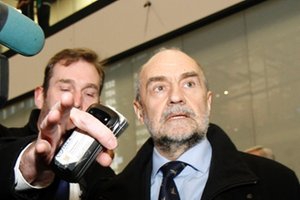 VIENNA (AP) -- A senior U.N. official announced progress Friday in long-stalled efforts to resume a probe of suspicions that Iran may have worked to develop nuclear arms, saying the investigation could be restarted by early next year.
VIENNA (AP) -- A senior U.N. official announced progress Friday in long-stalled efforts to resume a probe of suspicions that Iran may have worked to develop nuclear arms, saying the investigation could be restarted by early next year.Herman Nackaerts of the International Atomic Energy Agency spoke of headway after returning from talks with Iranian officials in Tehran, saying his team was "able to make progress" and the IAEA expects to "start implementing" an agreement on the probe shortly after new talks in Tehran on Jan. 16
He acknowledged that a key IAEA request - a visit to a site linked to suspected nuclear weapons research - was again denied. But he told reporters at Vienna airport that he expected IAEA experts to be allowed to go to Parchin, a military base southeast of Tehran, and follow up on suspicions it might have been used as part of secret arms-related experiments once the probe is resumed.
In Tehran, Iran's state TV also reported that there was no agreement on visiting Parchin. But in comments to state TV, Iranian envoy Ali Asghar Soltanieh called the talks "constructive," adding that "good progress was made." He also said a new meeting was set for Jan. 16.
While Nackaerts' comments gave cause for some optimism, they were not the first instance of a senior IAEA official saying that the standoff was close to resolution.
Returning from Tehran talks more than five months ago, IAEA chief Yukiya Amano said the two sides had agreed on "an almost clean text", saying a breakthrough deal would be signed soon. Follow-up IAEA-Iran meetings did not yield significant results.
Iran says it does not want atomic arms and has justified a nearly yearlong delay in cooperating with the IAEA's probe by saying that a framework regulating such an investigation must be agreed on first. But as talks on such an agreement have dragged on, agency officials have complained that they may be nothing more than a delaying tactic.
They are particularly concerned that such delays can hurt their efforts to investigate Parchin. The IAEA suspects that Iran has conducted live tests of conventional explosives there that could be used to detonate a nuclear charge and cited satellite photos indicating a cleanup of the site, at the sprawling military base.
Iran denies it is sanitizing the site, but Amano has warned that his agency's chances of a meaningful investigation there are diminishing.
Nackaerts offered no details on the substance of his talks. But diplomats familiar with the negotiations have said previously that the agreement was stalled because the IAEA wanted repeated access to sites, officials or documents of interest. Instead, Tehran demanded that once such access was granted, the person, document or site be off limits to the IAEA for repeated visits, questioning of viewing.
Amano's announcement of a nearly done deal in May came just days before the two sides met in Baghdad for a new round of negotiations meant to defuse tensions over Iran's nuclear program before leaving the negotiating table with little progress made.
This time, Nackaerts also spoke of movement on the probe as Iran and six world powers again prepare to meet, although they still have not said where and when. The six nations hope the talks will result in an agreement by the Islamic Republic to stop enriching uranium to a higher level that could be turned relatively quickly into the fissile core of nuclear arms.
Iran denies such aspirations insisting it is enriching only to make reactor fuel and to make isotopes for medical purposes.
By compromising on the IAEA probe, Iran could argue that the onus was now on the six powers to show some flexibility, temper their demands, and roll back U.S. and European sanctions that have hit Iran's critical oil exports and blacklisted the country from international banking networks.
In Washington, U.S. State Department spokesman Patrick Ventrell commended the IAEA for its efforts, but said, "We're disappointed that Iran did not grant access to the Parchin site, which Iran has been sanitizing in advance of re-engaging the IAEA."
Regarding the meeting planned for January, Ventrell said, "We hope that Iran starts the immediate substantive cooperation that is long overdue."
The IAEA has already visited Parchin twice - the last time in 2005. But it did not have access then to satellite imagery then and visited buildings other than the one now pinpointed by the aerial photos.
Emailing a series of commercial satellite photographs of the Parchin site to The Associated Press on Wednesday, the Institute for Science and International Security said the images showed "a steady pace of what appears to be the `reconstruction' phase of the site, which between April and July 2012 had undergone considerable alterations. " ISIS head David Albright frequently briefs U.S. government branches on Iran's nuclear program.
But a former IAEA inspector questioned what the information shown on the satellite photos actually mean.
"This `sanitization story' is an old wives' tale," said Robert Kelley, in an email Friday to the AP. "It is clear from examination of the satellite images that there is no concerted effort to disguise possible uranium contamination outside the building."
Kelley said the activities at Parchin reflected "a construction project, not a demolition effort," adding: "This is clearly not a sanitization."
By Associated Press
The Iran Project is not responsible for the content of quoted articles.











